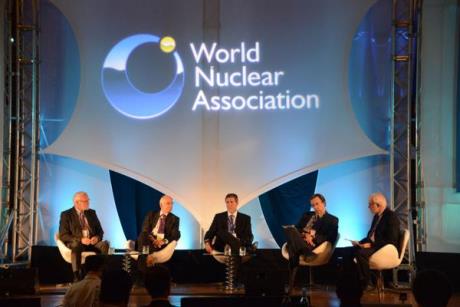Public needs radiation awareness
12 September 2014
CORRECTED: This story was amended on 16 September to more accurately reflect the statements of Roger Coates.
Educating the public on the potential health effects of radiation should be a long-term process and not just take place in the aftermath of a major nuclear accident, a panel of radiation protection experts agreed.
 |
| The panel, moderated by independent consultant Jack Valentin (Image: WNA) |
Speaking during a panel session at the World Nuclear Association's 2014 Symposium, Roger Coates, vice president of the International Radiation Protection Association (IRPA), said that the radiation protection community "have perhaps not been as honest as we could have been. Instead of saying that the risks were a certain level, say 5% per Sv, it would perhaps be more honest if we said 'if there is a risk of death, then it would not be more than that level, and could well be lower'."
Coates continued, "At normal levels of radiation in everyday life, including within the nuclear industry, if we express risks of radiation in what is defined as 'normal' ... we will be more honest and put us in a better situation."
The nuclear industry, however, "does not have a significant amount of research in low-dose areas" in its studies and concepts, said Willie Harris, director of radiation protection at US utility Exelon Nuclear. He said that, in some cases, there had been a mis-communication of radiation risks.
Wolfgang Weiss, a representative from the United Nations Scientific Committee on the Effects of Atomic Radiation (UNSCEAR), said that a system of radiation measurement should be put in the context of public health. Decision-makers, he said, should have "knowledge and flexibility" when talking about radiation protection.
Weiss said that in all aspects of life, if people understand risks, they can decide on whether to take them or not. It is not that people do not want to understand what we are saying about radiation risks, they can't understand them, according to Weiss. He suggested that the nuclear industry may need professional help from outside of its own profession to help the public understand radiation risk. Weiss stressed that influencing the public on radiation risks should not just be done after a major accident.
Coates said the IRPA "is working on a longer-term program to raise educational interactions to create a better platform for a debate on radiation protection." He said that there should be a balance between getting the industry's messages "to the right places and in the right context."
Malcolm Grimston, honorary senior research fellow at Imperial College Centre for Energy Policy and Technology, suggested that the effects of forcible evacuation on people's lives should be compared with the risks from radiation. "We should not err on the side of caution when it comes to radiation protection," he said. The social consequences of forced evacuation, such as increased suicides, alcoholism, etc - as seen in Fukushima - have far outweighed the radiation risks faced by the public, he claimed.
He suggested that the people evacuated from Fukushima should now be given an option to return to the less-contaminated areas. The Japanese government, he said, should say, "We have the information, these are the risks - we will support you if you go back, we will support you if you decide not to." This, Grimston said, would reduce the economic impact of the accident.
Researched and written
by World Nuclear News